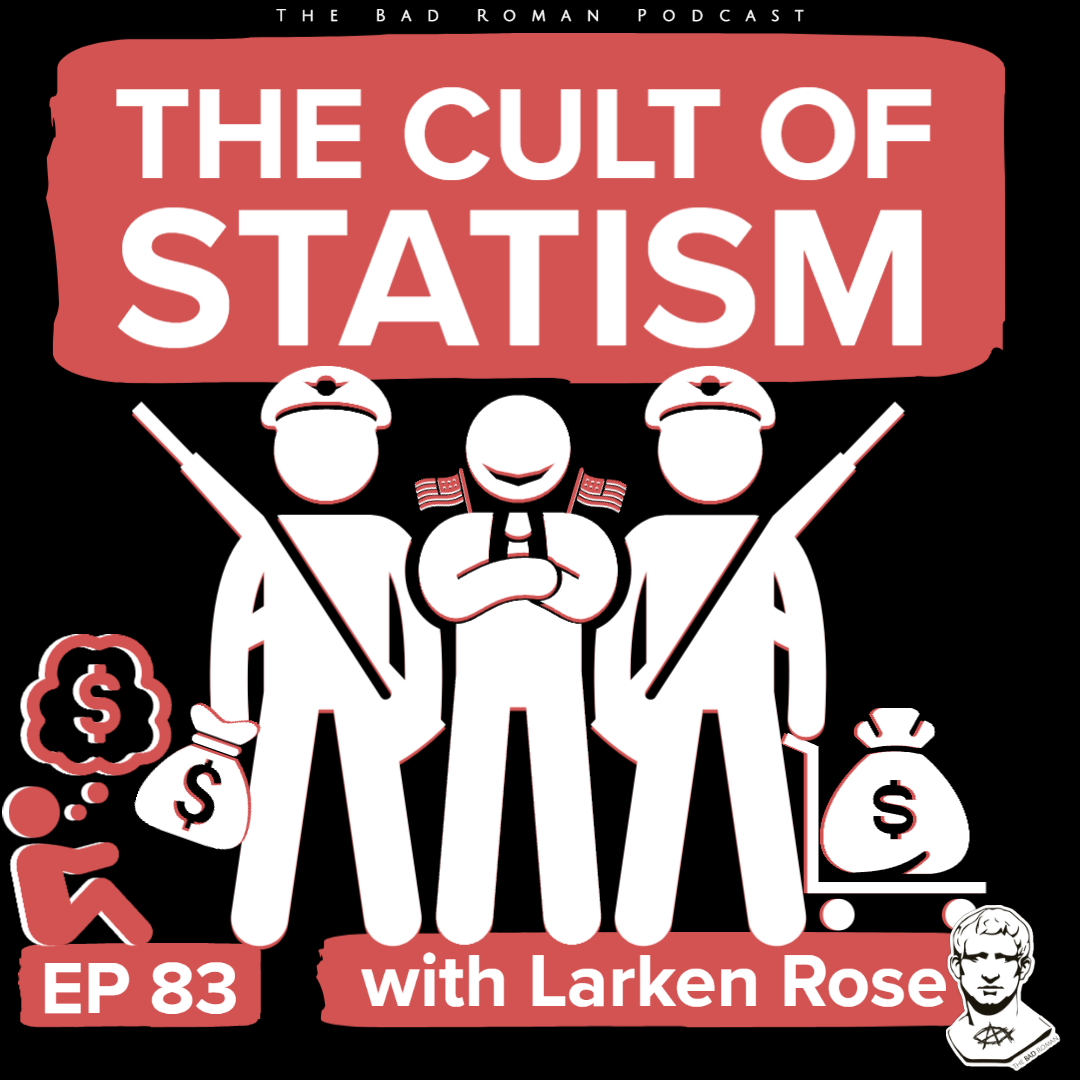Ever wondered why some people cling so tightly to the idea of government, even when faced with its glaring flaws? In this episode of the Bad Roman Podcast, we dive deep into the psychology of statism with Patrick Carroll, a brilliant thinker and writer who's been challenging the status quo for years.
Carroll's insights are like a splash of cold water to the face of conventional wisdom. He doesn't just critique government supporters – he dissects their motivations with surgical precision. And trust us, what he reveals will make you question everything you thought you knew about politics and society.
The Statist's Playbook: 10 Characteristics You Need to Know
Carroll breaks down the statist mindset into 10 distinct characteristics. It's like he's giving us a field guide to spot government supporters in the wild. But here's the kicker – it's not about judging them. It's about understanding why they think the way they do, so we can have more productive conversations and maybe, just maybe, change some minds.
1. The Humanitarian: The Road to Hell is Paved with Good Intentions
You know that friend who's always talking about how we need more government programs to help the poor? That's the humanitarian statist. Their heart's in the right place, but their solution is all wrong.
Carroll nails it when he says:
"The humanitarian impulse is great. Obviously, I also care about helping people. But I think it's important when we're trying to address why someone is pro-government to wrestle with the fact that they have a really compelling reason in their mind."
Here's the thing – we all want to help people. But using government force to do it? That's like trying to perform surgery with a sledgehammer. It might get the job done, but at what cost?
2. The Egalitarian: When Equality Becomes Tyranny
Ever heard someone say, "It's not fair that some people have so much more than others"? That's the egalitarian statist talking. They see inequality as inherently unjust and think the government should level the playing field.
But as Carroll points out:
"Even if we agree that maybe there's some value in creating a certain amount of equality in society, is that something that we should be coercing?"
It's a tough pill to swallow, but sometimes the cure is worse than the disease. Forced equality often leads to less prosperity for everyone.
3. The Paternalist: Big Brother Knows Best
This one's a doozy. The paternalist statist thinks they know what's best for you better than you do. They're the ones pushing for laws to ban "dangerous" foods or regulate every aspect of your life "for your own good."
Carroll hits the nail on the head:
"It's this very kind of self-righteous attitude of 'I know best, or you know, the government, us and our experts know best and don't worry, we're just going to take care of you.'"
Newsflash: Adults don't need a nanny state. We're capable of making our own decisions, thank you very much.
4. The Special Interest Group Member: Looking Out for Number One
This statist is all about using government power to benefit their group. Whether it's farmers lobbying for subsidies or corporations pushing for regulations that crush their competition, it's all about gaming the system.
Carroll doesn't pull any punches:
"It’s like you're telling me that you're willing to forcibly coerce other people purely so that you can financially benefit. How is that different from a thief going up to a guy in the street and holding a gun and saying, give me your wallet?"
Ouch. But he's not wrong. Using government force to line your own pockets is theft with extra steps.
5. The Risk Mitigator: Safety at Any Cost
Gun control advocates often fall into this category. They're so focused on reducing risk that they're willing to sacrifice freedom in the process.
Carroll offers a brilliant reframe:
"We live in a dangerous world, and that sucks. And definitely, I believe in systems like insurance to mitigate risk. I think mitigating risk is important. But we shouldn't be coercing people into mitigating risks."
Safety is important, but at what point does the cure become worse than the disease?
6. The Utilitarian: The Greatest Good for the Greatest Number?
This statist believes in maximizing social welfare through government intervention. They talk about "market failures" and think the state can fix them.
Carroll's skepticism is spot-on:
"I really question whether we can do any objective kind of social welfare calculations... And so I'm very skeptical of this idea that we can measure social welfare, let alone have the government come in and optimize it."
Even if you could measure social welfare, does that justify using force to achieve it?
7. The Theocrat: Legislating Morality, Putting more “Christians” in Office
Some statists, especially in religious circles, believe it's their duty to use government power to enforce moral or religious values.
Carroll offers a powerful counterargument:
"Is it really Christian to force morality on people? I totally understand the drive, but I would encourage Christians to really study the Bible and look at this."
Forcing virtue at gunpoint isn't virtuous at all.
8. The Resigned Follower: It's Just the Way Things Are
This statist has given up. They might agree with libertarian principles in theory, but they think a voluntary society is impossible.
Carroll's response is inspiring:
"I don't share that pessimism... I think we just need to look at history to have faith in the market."
Just because something hasn't been done yet doesn't mean it's impossible.
9. The Megalomaniac: Power for Power's Sake
Some people just love having power over others. It's a sad reality, but these statists exist.
Carroll's advice is simple:
"I think we just need to gang up on those people and tell them no, like, sorry, you're not going to get your way and you're not going to use us as pawns."
No elaboration needed. Power-hungry individuals have no place in a free society.
10. The Intolerant: The Heart of Statism
This is the core of the statist mentality. All the other characteristics boil down to this:
"At the end of the day, the conclusion is, I am going to be intolerant of you living your life as you see fit. I'm going to force you to comply with my value system and my personal beliefs. And that is something that every statist shares by definition."
It's a harsh truth, but an important one. Statism, at its core, is about forcing others to live according to your values. It's not about left vs. right. It's about whether you're willing to use force to make others live the way you think they should.
What We Learned About the Statist Mindset
This episode is a wake-up call. It challenges us to examine our own beliefs about government and ask some tough questions:
Are we truly tolerant if we support using force to make others live as we think they should?
Can we achieve our goals of helping others and creating a better society without resorting to government coercion?
Are we willing to apply the same moral standards to government actions that we apply to individuals?
The answers might make you uncomfortable. But that discomfort is the first step towards a more consistent and ethical worldview.
Ready to have your mind blown? Listen to the full episode and prepare to see the world in a whole new light. And remember – questioning the status quo isn't just rebellious. It's necessary for a free and just society.
🤝Connect with Patrick:
Twitter (X),
The Prudent Navigator (website/blog)
Read Patrick’s Mises Institute Articles
Episode Timestamps:
(0:22) Patrick Carroll returns to discuss "The Anatomy of the Statist"
Exploration of the Statist mentality and its challenges
Previous appearances on episodes 16 and 55
Episode 16: If You Vote You Can’t Complain
Episode 55: Is Taxation Slavery?
(0:58) Patrick's recent work and philosophical journey
Managing editor at Foundation for Economic Education
Focus on economics, policy, and libertarian philosophy
Influence of thinkers like Nietzsche, Rothbard, and classical liberals
(4:17) Discussion on Patrick's writing style and approach
Larken Rose on the Bad Roman
Episode 83: The Cult of Statism
Episode 91: Breaking Down the Jones Plantation
Episode 134: Immigration and Christian Values: Challenging the Border Fetish Brigade
Emphasis on direct, matter-of-fact communication
Importance of consistency in thinking and living out principles
(5:47) The appeal of libertarian philosophy
Internal consistency and principled approach
Rejection of exceptions to moral principles
(7:45) Breaking the framing of political conversations
Libertarianism as a refreshing alternative to left-right dichotomy
Questioning cultural assumptions about government
(10:37) The Anatomy of the Statist: 10 characteristics
Humanitarian impulse and its relation to statism
Egalitarian motivations for government intervention
(17:47) The utilitarian perspective on government
Market failure arguments and social welfare calculations
Skepticism towards government optimization of social welfare
(23:17) The theocrat and Christian involvement in politics
Critique of using government to enforce Christian morality
Biblical perspective on non-interference and servant leadership
(31:41) The risk mitigator and government regulation
Gun control as an example of risk mitigation through legislation
Alternative approaches to risk management without coercion
(53:57) The megalomaniac and power dynamics of government
Addressing those who seek power for its own sake
Importance of resisting authoritarian tendencies
(56:24) The heart of the statist: intolerance
Common thread of compelling others to live by one's values
Contrast with libertarian principles of live and let live
(59:52) Taxation as theft: beyond metaphor
Clarifying the libertarian position on taxation
Ethical implications of equating taxation with common theft
(1:03:43) Free market principles and conservative inconsistencies
Critique of tariffs and government regulation
Importance of genuine free market understanding
(1:05:31) Conclusion and resources






















